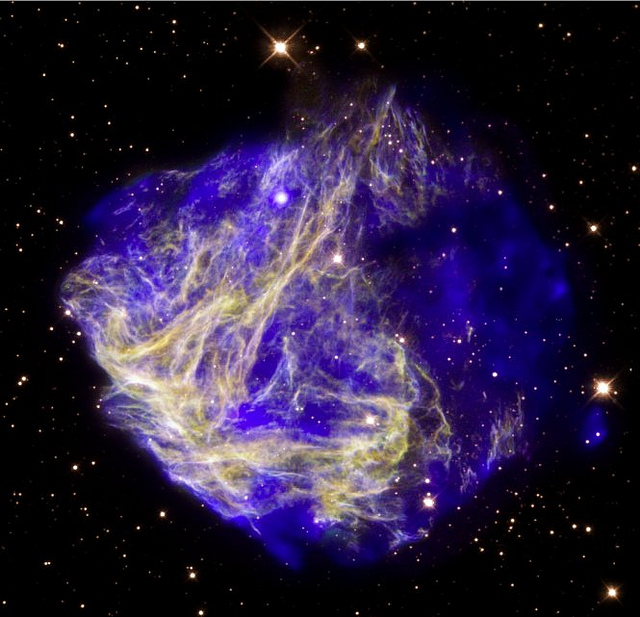
Invincibility photo credit: NASA’s Marshall Space Flight Center via photopin cc
Invincibility is a story killer.
The magic in fantasy or the technology in science fiction can be so awesome that nothing is able to stand against it.
For storytelling, this is bad.
Story needs conflict, a way to endure or overcome, a real chance of failure.
If the hero is so endowed with greatness that no villain can hope to match him, the reader gets bored. If the villain is so powerful that justice becomes impossible, the reader loses hope. Whichever, the book is tossed aside.
So how can storytellers deal with this? How have they?
Five examples:
Superman
There’s no getting around this guy.
He takes on nuclear bombs. He punches through the earth’s crust. He flies around the world backwards to re-spin time. (A pill I didn’t swallow very well.)
Is it any wonder his enemies take on comical traits? They can’t help themselves against such awesomeness.
For these reasons, I’m more intrigued with Superman’s origin on Krypton and his boyhood on Earth than anything that happens once he’s a man.
Look at the 80’s movie Superman. The best part is while Clark’s in Smallville; the best scene is him as a teenager outrunning a train.
Once he’s in Metropolis, the movie’s still fun, but it becomes campier. He falls for the skinny, cranky, and frankly snobbish Lois. (And she smokes, for heaven’s sake.) He stoops to combat the mere mortal Lex Luthor. Well on thought, Luthor at least figures out Superman’s weaknesses of
1) necklaces with green stones,
2) non-omnipresence, and
3) Lois Lane.
So Lois dies. What! This is where the grieving Superman ends up turning back time. Really? The writers let their heads get away from them.
The new movie, Man of Steel, at least has a better Lois – I mean, who can object to Amy Adams? – and a deeper look into Clark’s psyche. But by the end the Kryptonians are throwing each other around through steel and concrete like a pillow fight. You can’t tell me that some of that didn’t hurt. Then Superman snaps General Zod’s neck. Really?
He should have led with that.
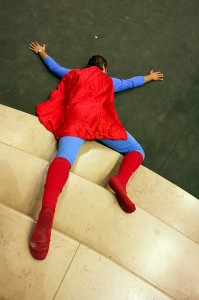
Superman Splat photo credit: c-reel.com via photopin cc
The way the creators of Superman got around this invincibility problem is the mineral Kryptonite. Otherwise, Superman is near god-like: Omnipotent though not omniscient or omnipresent
I wonder if human failing is why my sons like Batman more.
Lord Voldemort
After a book or two of Harry Potter, you wonder why Dumbledore can’t just get after Voldemort and be done with it. But Rowling anticipates this. In Book 6 the Muggle Prime Minister asks why the magicians can’t just take care of their problems with magic.
The answer: The bad guys have magic, too.
And there is the solution to invincibility in fantasy magic. The bad guys have magic just the same as the good guys.
Another thing, magic mostly has to be learned or earned or obtained, and if inherited, then it needs developing. And it can conceivably be lost. Why, in the old TV series Bewitched, magic was affected by illness.
And they had to call Dr. Bombay.
An author can impose limits on magic through the rules of the fantasy world or just because mere mortals are dabbling in things larger than themselves.
The Death Star
Star Wars introduces the Death Star as invincible then proceeds to hint at its Achilles’ heel. (Achilles was Homer’s invincibility problem. His solution was a heel. Hmm…)
Anyway, what was going to be able to defeat the Death Star? A shot through an exhaust shaft? Really? Couldn’t the emperor’s designers have anticipated a small attack?
Another thing: How could the Death Star have sped across the galaxy and then be so pokey to clear a planet to take out the rebel moon? Why didn’t the Death Star just blow up planet and moon?

Death Star Homesickness photo credit: Kalexanderson via photopin cc
It’s not profitable to look too deep into this. Star Wars is a good story with unforgettable heroes and iconic villains. It delivers an amazing enemy base that makes for a great blow-up scene and riveting John Williams music
But remember, this is the same universe that spawned Jar-Jar Binks.
Like I said, I think it’s best we don’t dig here too long for insights into invincibility.
The Eagles of Middle Earth
Okay, did anyone wonder, once seeing Frodo and Samwise rescued from the lava-flooded slopes of Mount Doom by the eagles, why Gandalf didn’t use the eagles to begin with and just drop the darn ring right into the volcano?
Of course, then we wouldn’t have a trilogy.
The eagles in The Lord of the Rings come close to the problem with invincibility. They’re regal, awe-inspiring, way cool. They offer a means out of a predicament. They save our heroes…
But it’s near cheating.
They’re like the cavalry in westerns. Dona’s granddad use to say an episode of Gunsmoke was no good if it had too many women or had to resort to the cavalry to save the day.
So when telling your story, don’t write yourself into such a corner that you need the cavalry or the eagles.
Unless it’s just too cool to pass up.
The Q Continuum
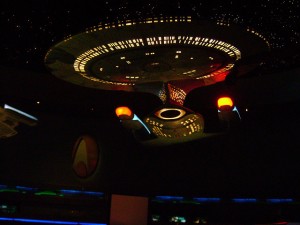
Next Generation Enterprise photo credit: Edward Beavers via photopin cc
In Star Trek: The Next Generation we meet Q. He’s unstoppable, he’s mischievous, he has a proclivity for wearing uniforms he hasn’t earned
And there is nothing Captain Picard can do about it. The crew’s only success is to try to out moralize him.
Very precarious.
Imperfections in a character are needed for an interesting story, but when one of the character’s strengths is invincibility and one of his weakness is moral deficiency, the character quickly degrades to cruel.
But it’s Q who illustrates a particular theological point. Being human – and an imperfect one at that – necessitates a God that not only is omnipotent but also ever-constant and all-merciful. Otherwise, we’d all have been dead long ago… or never existed. As Malachi records, “For I, the Lord, do not change, therefore you, O sons of Jacob, are not consumed.”
I’m glad Jesus is not Q.
Invincible in Summary
The summation is that invincibility comes at a price. The price could be a twist that contorts the story too incredulously. The price could be rescue by a cheat. Or it could be glossing over details hoping no one notices, like the man behind the curtain in the throne room of Oz.
The price could be the story itself.
Don’t let invincibility vanquish your story.

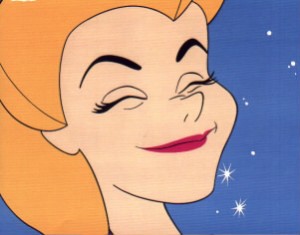
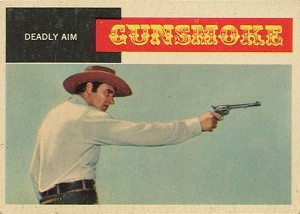
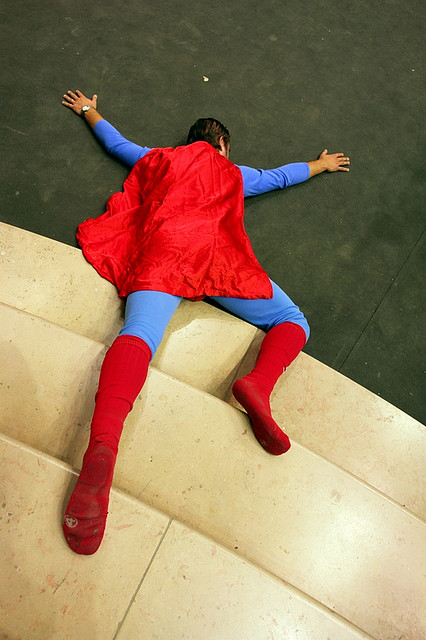

[…] the Next Generation, who could ever figure out Will Riker and Deanna Troi’s relationship? Hints, but not enough […]
[…] a writer has written themselves in a corner and tries to shove some weird ending down my throat I’m not going to swallow the […]
[…] there is barely any conflict and certainly no connection to us frail humans. For this reason, Superman is always in search of a worthy villain who possesses a lump of […]
[…] and over our heads flew an unimaginably large spaceship. It went on and on, seemingly endless. Star Trek’s Enterprise was a mere pipsqueak in […]